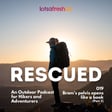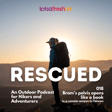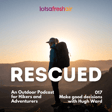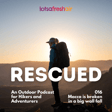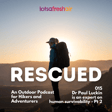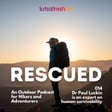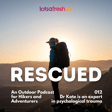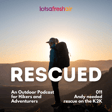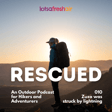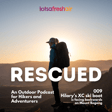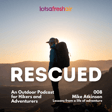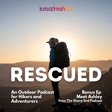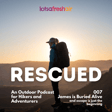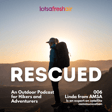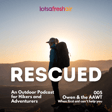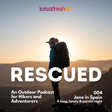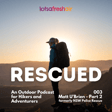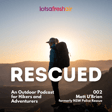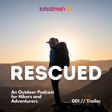Become a Creator today!Start creating today - Share your story with the world!
Start for free
00:00:00
00:00:01

013 // Joyce is bitten by a snake
According to the World Health Organisation, roughly 1 to 2 people die from snakebite in Australia each year. The good news is this is significantly lower than the 1920’s when the Sydney Morning Herald reported about 13 people were dying each year.
Today we hear from Joyce, who bucks modern statistics which tell us that 74% of victims are male, with an average age of 46, and interestingly, with around 54% of bites happened at home.
She’s joined by her friend Frances and together, they share the story of what happened when along a spectacular, grade 5 track, over 3 hours from the nearest road, she describes what felt like a sharp stick hit her ankle.
Learnings from this episode:
- First Aid Training (preferably Wilderness (WFA) or Remote First Aid (RAFA) or Remote Area First Responder is essential for you and also those you walk with or meet along the way.
- How to treat a snake bite - what they did.
- The importance of carrying more than 1 snake bandage.
- When calling for help in the bush in coverage, call 000. Anecdotally, Police (rather than Ambulance) may be better equipped to locate you in a remote location (ie. away from roads/tracks/etc.)
- The incredible benefits of walking with a group where you know the skills and capabilities, rather than strangers (support, first aid, navigation, bushcraft, tasks, team management, etc)
- Understand that your backpack may not travel in a rescue helicopter. Pack smart.
- The value of debriefing with your group after a crisis. Taking a moment to take it all in and be gentle on yourselves.
- Utmost importance of being prepared: packing everything you need.
- Learning to mitigate risks: wearing long pants, gaiters, first aid kit and training, communication methods (for in and out of coverage).
Helpful Links:
- My comprehensive packing lists (day hikes, overnight hikes)
- What's in my first aid kit?
- Bites and Stings app
- Find a club in your state! Bushwalking Australia -
- Emergency+ App
- What3Words
Transcript
Introduction to 'Rescued' Podcast
00:00:03
Speaker
Rescued is a podcast of conversations with rescuers and those who've been rescued. It's about the lessons we learn about ourselves, the places we go and why, without judgment or shame, to help us have better adventures, manage risk and deal with the unexpected.
Snake Bite Fatalities in Australia
00:00:22
Speaker
According to the World Health Organization, roughly one to two people die from snake bite in Australia each year. The good news is this is significantly lower than the 1920s when the Sydney Morning Herald reported around 13 people were dying each year. Today we hear from Joyce, who bucks modern sta statistics which tell us that 74% of victims are male with an average age of 46 and interestingly with around 54% of those bites happening at home.
00:00:57
Speaker
She's joined by her friend Francis and together they share the story of what happened when along a spectacular grade five track over three hours from the nearest road she describes what felt like a sharp stick hit her ankle.
Joyce's Hiking Journey
00:01:14
Speaker
Let's start with you, Joyce. How do you know Francis? Well, I've been very privileged to know Francis through the Bushwalking Club, SPW. Ah, SPW. So what does that stand for? Sydney Bushwalkers. Ah, and have you been a member of the club for a while?
00:01:30
Speaker
So I think I joined in June 2016. So you've been in the club, yeah, that's about eight years. Yep. And for people who aren't familiar with clubs, I might even ask Francis. So what is a bushwalking club? what does it What does it
Benefits of Joining Hiking Clubs
00:01:46
Speaker
exist for? And what does it sort of, you know, what does it look like?
00:01:49
Speaker
Well, the Sydney Bushwalkers is a volunteer-based leading kind of club. So you join and then you have to do qualifying walks and some other little bits and pieces as well.
00:02:02
Speaker
But um the walks are led by the people that are actually in the club and you get to sort of go to places that you would never have dreamt that you could go to on your own or even know about. yeah And I was really lucky that I joined 12 years ago now and a lot of the older people in the club that aren't there any longer sort of took me to places that I'd never been before.
00:02:27
Speaker
So then I could then take other people there, yeah which is really great. So you yeah you get to meet a whole community and see places that you were just never dream existed before then. So clubs sound a pretty amazing place to meet like-minded people um with a similar interest. And I love that idea of passing down the knowledge and passing on the traditions and the um the ways of doing things. So apart from being taken to places that you probably may not see on the internet or on all trails and all those kind of things, you're seeing different places, you're being taken different places. What else does a club sort of teach you or equip you for? You learn a lot from the people around you always, navigation wise, how to read a landscape. When you're out there with a bunch of people, maybe that you hadn't met before,
00:03:22
Speaker
And someone will, even on overnight camps or whatever, you just learn so much, like, oh, you've got that, you know, like, great idea. Why didn't I ever think of that before? And, you know, and you can pass on knowledge as well.
00:03:37
Speaker
which is really fun. Yeah. So Joyce, I'm thinking it's things like, you know, um how to pack or what to take with you and um how to, you know, maybe look at the weather or all that
Learning Essential Hiking Skills
00:03:51
Speaker
kind of thing. is is is um Is that right? Yeah, absolutely. So I remember when I first joined, I didn't realize that not only did we have to do qualifying walks, but we actually had to do this skills day. um And um during the skills day, like they literally took you around how to pack.
00:04:07
Speaker
your pack for an overnight, how to read a map. you know And they took us through quite a few things, even first aid. I think there was a bit of a food thing and like quite a pack for what would take with food and things like that. So um that was really fun. um And I had you know past experiences before I did that skills day, but I just loved how they actually have that as part of their qualifying experience for every person who wants to join. Because I think it sets a standard of you know how things should be done and why do they do it because they want to make sure everyone's safe. I think for people who maybe haven't heard about clubs before, it might be a whole new concept or way of entering into the bush or getting used to the bush and learning how to yeah to do the bush or learning how to how to be in the bush. um so You said but you came into the club with some skills. so Have you always been ah a bushwalker or a hiker, Joyce?
00:05:04
Speaker
Pretty much growing up in high school, mum and dad used to take us always to the mountains on a Saturday. So that was something that we used to do as a family. So it was really fun and exciting. And I kind of grew up just loving the outdoors. um But high school was where it actually clicked. I remember year 11 PDHPE. We did an outdoor rec component for our PDHPE unit of study. um And that's when I was like, this is this is life.
00:05:33
Speaker
Yeah. And we fully went and did a big outdoor expedition. And I remember coming back home and saying, this is what I want to do. And what about you, Frances? Have you come from a background in in the bush?
Frances' Entry into Bushwalking
00:05:46
Speaker
No, I wouldn't say that, even though I grew up in the western suburbs of Sydney and it was pretty bushy out there. But, you know, I grew up in the time where, you know, you got locked outside until um the sun went down and then you came inside.
00:06:01
Speaker
I didn't really get into bushwalking and until um I was rowing at at Sydney Uni and one of the women that I became friends with there lived in Wentworth Falls. And when we were rowing up on the Nepean or um at the Penrith Rowing Centre, we would often go to Wentworth Falls and stay with her.
00:06:23
Speaker
And then we'd you know go on the national pass and Darwin's walk before Darwin's walk was all paved. It was all sort of bushy. And I used to think that that was the end, the end, the all of bushwalking that there was. It was just went with falls and nothing else. But we went there a lot. And that was what sort of um got me into being out there and loving the big open spaces and the views and you know the challenge of walking around for several hours.
00:06:53
Speaker
on um different terrains and things instead of just on a footpath. Yeah, very different. So so Wentworth Falls, we're we're talking about the Blue Mountains in New South Wales here. Yes. um So have you both walked in the mountains quite a lot before this experience that we're going to talk about in a little while? Joyce, have you spent much time walking in the mountains? Not as much as I'd like to.
00:07:18
Speaker
um so pretty much that year, which was 2023. i had done quite a few walks. and I think, particularly in that same area where we were walking, um that was probably the fifth trip for that year. Oh, wow. Just to give everyone an idea of the amount of time you get out in the bush, because some people might be you know occasional bushwalkers, maybe once or twice a year, but that sounds like that's not the case. Is that right? and Yeah, that's right. so that I will pretty much weekly. so Every weekend, you're out you're out in the bush somewhere. Pretty much.
00:07:52
Speaker
Yeah, amazing, amazing. Any of those day walks or overnighters, Frances? Oh, I prefer the overnighters, but I do walk, do lots of day walks every weekend. I'm either out with city bush walkers doing an overnight walk, or I'll be with Joyce and Co doing a day walk somewhere in the Blue Mountains.
00:08:11
Speaker
A Joyce and co with a day walk somewhere in the green hands. It all sounds and pretty wonderful. Now, so take me to this particular day that we're going to talk about in this trip. Was this a ah day walk or an overnight walk,
Training Walk Preparations
00:08:26
Speaker
Joyce? This was a day walk. This was a training walk. A training walk. Explain to me and explain to us what a training walk is. So it was pretty much us keeping ourselves fit because we were heading in, like literally heading overseas.
00:08:40
Speaker
um not long after to do a pack walk. So we thought we'll get a bit of training, a bit of scrambling and hopefully, you know, keep our baseline fitness. And tell me a bit about the walk. What was the sort of a day walk and how many hours would you have expected to be on your feet? I reckon around six.
00:09:01
Speaker
Am I right, Frances? Yeah. Six, seven with breaks, perhaps. Yeah. So who wants to tell me about the walk? And was it a club walk or a Joyce & Co.
Unexpected Events in Nature
00:09:12
Speaker
Frances & Co. walk to a bunch of friends? How did the plan for the day come together? Well, it's i I feel like it was a day walk in our backyard, really, because it was a walk we had done more times than I can possibly remember.
00:09:27
Speaker
you know, down the golden stairs and up the coral wall knife edge. And we were just going to have, you know, a sandwich on a rock, being Melville's lookout. um So, and we had done it, I can't remember how many times before, because it is a good climb. And it sort of gives you everything. Two climbs, one climb down, one climb up, and then down and back up again.
00:09:48
Speaker
um And yeah, it's around the corner from where I live now in Katoomba. So we're all pretty familiar with meeting up at Naranek Lookout and taking off at Mount Solitary. And um we did have our little our New Zealand group plus one extra, didn't we because we had Hugh and Luke and Joe. Yeah. So there was five of us all
Hiking Mount Solitary
00:10:14
Speaker
together.
00:10:15
Speaker
five in the group. That sounds like a good good number for a group size. Tell me about the walk itself then. so it Mount Solitree. Joyce, can you tell me a little bit about that for people who may never have seen it, just in terms of where it might be near other icons that they might be familiar with in the area? Yeah, so if anyone's been to the Blue Mountains or to Katoomba Lookout,
00:10:38
Speaker
When you're actually standing at the lookout, you see this big rock right in front of you. It's this big rock and it's green. Lots of trees on it. And literally that is Mount Solatree. You can't miss it. It's huge. um And there are a couple of ways to actually get there that are all on track walks. And so we're our aim was to actually make our way to Mount Solatree via Naranek.
00:11:05
Speaker
Okay, so when you say Katoombi Lookout, so this is um that main big, the tourist one, Echo Point, is it? We're the three sisters. That's the one that blows at night, the one that's lit at night. Yes, indeed. Okay, so you said it's massive, this this rock, this sort of like stands up like its name says, Mount Solitary. So Frances, how many just roughly, do you know how many kilometres across the top, like the length um from that view it is? I think it's about three.
00:11:33
Speaker
yeah from the coral world to back to the east coal which is the other end of it um and there's several ups and downs there's a distinct track that goes right the way through but there's quite a bit of rock climbing and you know, some and going down into what Chinaman's gully, which is the first one from the coral edge. It's not flat. There's lots of ups and downs. And it's it's not really considered a super easy walk, but it is an easy walk. Do you happen to know what the Australian walking track grading system grade for that walk would be? I think they rate that a five, a difficult. Yeah, because it
00:12:12
Speaker
go right across the top, coming down the East Coal, as you know, there is some tricky bits there. It's a kind of like a big tabletop feature out in the middle, and it's three kilometres across the top of this table. um Yeah, but not flat. Okay, so I'm building a picture here. perfect And tell me, what time of year was it? Joyce, was it in the weather on the day? Oh my
Experiencing Extreme Conditions
00:12:35
Speaker
goodness. Yeah, 16th of December, 2023.
00:12:38
Speaker
not It was over 30 degrees. it It felt like it was over 30 degrees. It was a very hot day. So what kind of stuff were you carrying with you? with So there's the five of you there and you you all knew you were all experienced and and training and fit. What kind of stuff did you have with you? Okay, so I carry my day pack with me all year round. I don't don't do any changes other than what I put in as food. It's the only thing that changes each time.
00:13:05
Speaker
So in that pack, it's pretty much got my first aid kit. That's a must. I actually carry a trowel with me as well. I also carry with me um my, like it's kind of like an in reach. Yep. A gum and one of those send. Yeah. the garmin ones yeah um So that's always with me as well. um I also carry with me hydro lights, which is part of the first aid kit. I carry with me two snake bandages.
00:13:34
Speaker
um all year round as well, plenty of water and of course food. And in winter, sometimes also pack just spare thermals and wet weather gear. Yeah, absolutely. And Frances, would you say you had pretty much the same or anything different to that? Oh, no, nothing different to that. Very much exactly the same. where You get a routine together, the bag,
00:13:56
Speaker
just has the same things in it all the time. It saves on packing, makes it easy. Oh yeah. It just goes in the cupboard and comes back out. Like Joy said, it's food and water that goes in. so Take me to the start of the day. Take me to the morning you've got yourselves out to Naranick Lookout to where you were meeting up and starting. Talk me through the next, what happens next? What's the next couple of hours looking like for you? Oh, I think we're all in um a really good mood at that stage because we had New Zealand to look forward to and um Christmas was coming up. And I think um Joyce had finished work. She had one day left or whatever. So I remember Joyce being in a particularly good mood to be out.
00:14:40
Speaker
and on the trail. and um And it was really beautiful early morning. It was quite cool at that stage. And of course, the beginning is all going downhill. So everyone's always in a good mood when you're going downhill. And and when you get onto the the track, it's got a beautiful canopy over it. So it's quite cool. And it's just, in thislyrebirds and and it's just quite nice to be down there. And I can remember us all just, you know,
00:15:09
Speaker
being in such a great mood and taking off and, you know, looking forward to um just being out for the day. Sort of a bouncing the step at the start of the day. It was, yes. And Joyce, how would you describe to someone who's never seen that type of um habitat that you're walking through, what can how would you describe that? It's just really fresh air.
00:15:33
Speaker
It's just that real crisp, fresh air that you don't see in, you know, Sydney. It was a really clear day. I just remember just, you know, setting off and um it was just very fresh. Yes, it was going to be a very, very hot day, but when we first started out, it smelled good. It felt good. What kind of environment is it? Sort of eucalypt forest or rainforest or somewhere in between or bits of both? There is quite a lot of rainforest there because you're down the side of the plateau called Naronec.
00:16:02
Speaker
And in over the last few years, we've had a lot of rain. So ah and a lot of landslips coming down and over the track. um So and can parts of it can be quite damp. There's quite a lot of trees and the national parks have done a great job of um sort of cutting steps into big trees and and making it sort of quite interesting as you go along. And you do have to sort of watch your way a little bit. And they're still working on it now trying to make um that track accessible again after more rain and more landslides that have happened recently. So you walk past a couple of other features on the way towards Mount Solitary, which at this stage, based on what you were saying, it sounds like it's kind of looming in front of you a little bit. um Because you know you've gone down, you're you're going to have to start going up again.
00:16:57
Speaker
So Joyce, take take us into that that space when you're at the base of of Mount Solitary. Yeah, so um we pretty much pass the downhill part and then we get to where the climb started. And I just remember just looking up going off like such.
00:17:17
Speaker
um So yes, no, but we started the climb and we're all in conversation, um you know, everyone's you know catching up for the week or the ti or how long we haven't seen each other for. and We kept going and um we it's a kind of cool section because there's a bit of that scramble where you've got to climb up a bit, a few sections. So it's sort of not like rock climbing technically, but it's pretty serious rock scrambling through sort of narrow slots and boulders and things like that, isn't it? Yes. yes And so what happens next? Just as we got to the top, I think it was the once you get to the top and it starts to plateau again.
00:17:56
Speaker
um There's a really nice kind of ah big rocks where you can just sit in and see other. Yeah, it's a really nice section up there. Yeah. What do you see from up there, Frances? Well, you can see all of the Jamison Valley and you look across to Katoomba and also you're sort of looking directly across at another part that comes off Naranet called Castle Head.
00:18:21
Speaker
And you can from that this the view from up there is really something else, and especially at that sort of mid-morning kind of time, there's a mist over the mountains that is really lovely to see. And you do get up just high enough.
00:18:37
Speaker
to be able to look down over both sides because she's sort of looking directly back at um another little um group of rocks called the ruined castle. It's just, I mean, it sounds magical. So you had morning tea. What happened then?
00:18:53
Speaker
um we ready to continue on to our lunch destination. Great. Well, everything's sounding like it's going pretty well so far, Joyce. um yeah and what time So what time was this? Oh, it would have been around 10.30. So you're starting to move um sort of along the the flat area at the top then, yeah? Correct, yes. Take me through what happened. So I remember very clearly that I was at the front for a bit.
00:19:21
Speaker
I was leading the pack and I took them in a little bit of a wrong direction accidentally.
Joyce's Snake Bite Incident
00:19:29
Speaker
And then I just got called back going, Joyce, you're going the wrong way. And I'm like, oops, sorry. And then I just ended up just tucking away in a different line number. I'm getting the sense that this isn't a story about being lost in the bush.
00:19:45
Speaker
No, it was quite funny because where I was behind Joyce and where she went off, it's like everybody does that. It's very was very minor, but it was just enough time for me to go tracks over here and like three or four steps. And then I was ahead of Joyce and then Joe came in behind me and we were still on a very distinct track. And there was just like a pile of sticks on the on the track absolutely nothing you would even think twice about so i stepped over them kept going joe stepped over them and kept going and then joe stepped over them what happened when you stepped over the sticks i think i stepped on the stick i must have stepped on something um because something just then launched at me um on my left side
00:20:35
Speaker
Right. Completely out of the blue. And you're on a track though. You're not in scrub or anything like that. Low level scrub. very It was just, it was a very plain track with just a little pile of sticks. You wouldn't even look at it twice. And um then all of a sudden Joyce yelled out, that stick jumped out at me. That really hurt. Yeah, Joyce. So explain to me or tell me what you remember from that moment.
00:21:04
Speaker
Yeah, so literally I was in conversation. I felt I stepped on something and then all of a sudden something just launched at my left ankle. And it felt like it was a rock. It was as if like some rock just went smacking at my left ankle. And then when I looked down, I saw two puncture marks. And yeah, and that's when I was like, I think I got bit on by a snake.
00:21:28
Speaker
Right. can you Can you remember what you were feeling or what went through your mind at that time? I just remember going, okay, i this is the worst thing that could ever happen because now I've got to stop. I can't do anything um and I've got to actually, I've got to strap it. like The first thing I came to my mind was like, oh my gosh, I've got to sit down and I've got to strap this thing because I don't want the venom to make its way into my body.
00:21:52
Speaker
That's the first thing that came to my mind. um And I was very, very fortunate to have everyone say, sit down, sit down quickly, sit down. We're actually Googling what does snake bites look like? Yes. and Reception. so And we're taking photos of an ankle and then comparing phones. Like, yep, that looks like a snake bite. Wow. And so did you see anything moving in the ground or anything like that? No, no. Even even Hugh went back to have a look, to see if anything looked that had to, like, even if a stick had two things that would, like, penetrate in that way, and there was nothing. Absolutely nothing.
00:22:33
Speaker
Massive thanks for the support from the team at Patti Pallon, who since 1930 have been leaders in travel and outdoor adventure. In fact, did you know that Patti himself, a member of the Sydney Bushwalkers Club, was a volunteer in the original search and rescue arm of the Federation of Bushwalking Clubs in New South Wales? Huh, nice one Patti.
00:22:55
Speaker
So we're now at what what time of day? Is this about 11 o'clock-ish? Sure was. Right. And the fact that you you said, oh, I need to strap it. I need to sit down and I can't do anything. Where did that knowledge or that understanding come from? Well, I had just finished a first aid course a week before and Jo had just done her first aid training as well.
00:23:21
Speaker
so It was weird. like I think everybody kind of like just went into action to go, okay, what this is serious, sit down, you can't move now. and so How did you each decide who was doing what? and Because there's different roles and different tasks that would happen, aren't there?
00:23:42
Speaker
well i think Joe was very decisive and um just started getting everybody's snake bandages out and just ripped her shoe off and started bandaging straight away. I think Luke was the one that said, you know, like, well, if we're treating it as a suspected snake bite, who's calling emergency?
00:24:01
Speaker
And I think jo Joyce then stopped Googling what snake bites look like and dialed zero, zero, zero straight away. Meanwhile, I think, you know, ah I was assisting Joe with the, you know, wrapping of the leg from one end to the other. And um yeah, that's kind of how it went. And then Joyce was on the phone then because they're so fast.
00:24:26
Speaker
So there was um lots of phone conversations. And I think one of the really interesting things there is knowing the capabilities of the people you're walking with and knowing you can trust and you can rely on them when or if something does go wrong. And I'm a member of bushwalking clubs as well. and knowledge, knowing that the people have got my back and that they come with at a certain level of first aid training themselves, a certain amount of skills. Whereas sometimes I wonder when people just meet up in groups online or you know and I'm not saying they don't have the skills, but these are all strangers and you meet up and it's great because you're building community out there, but can you rely on these people? It's made me um realize how important your
00:25:12
Speaker
group is, how important the people are. and And even though, you know, you might not know the people that you're going out with that well, but I think, you know, because it's the Sydney Bushwalkers is such a community, well you would take for granted that they um would be able to handle the situation. And having come across myself a few times, it's always It's very comforting to have people around you that you know um want the best for you and want to help you as much as possible. Just always so grateful e when ah when something happens to you.
00:25:47
Speaker
you know the people around you are there for you. It's just so important. Let's break it down a bit. So Joyce, you you made the call yourself, did you? I did, yep. I was on that phone, sitting down, getting my leg bandaged, and then all of a sudden I was like, okay, zero, zero, zero, going, ambulance, please.
Emergency Response to Snake Bite
00:26:07
Speaker
Yeah, and how long do you think that took between um the snake bite to when the bandage was going on and you were making that call? I think it was minutes, not even, yeah, I think two, three minutes. So there's five in the party.
00:26:25
Speaker
Joyce is on the ground. Frances and Jo are ripping out snake bandages. Now, you said, Joyce, that you carry two bandages with you. Is that standard for the people that you walk with? Interesting you say that because um when I first joined the club eight years ago, um a particular leader literally had on his email to say, you have you to join my walk, you need to have a minimum of two snake bandages with you.
00:26:54
Speaker
What did you think about that at the time? um At the time, I was like, seriously, too? Now, these ah when you say snake bandages, can you just explain what might be different between a snake bandage and your normal everyday roller crepe bandage? like The snake bandages that I've got, once you stretch them,
00:27:15
Speaker
you know by stretching them how how far you need to actually have it. that It just tells you how tight you need to actually have it wrapped around you. So it's an indicator. Cool. Because none of us who head out in the bush with a first aid course are experts in you know everything. We're not paramedics, we we're not doctors. um So snake bandages, you had two. And so in the party, how many bandages do you think you had in the group of five?
00:27:44
Speaker
Well, we would have had six. I think Joyce was the only one with two. I think I and only carry one. So you sat down, you didn't move other than picking up your phone. um People were treating you. We're talking very much about the the physical side of things here. What was going through your head and and your heart at this point? What were you but was happening in down here? I was at peace and I knew whatever God had for me that day,
00:28:13
Speaker
I knew I knew it was for my own good. And I guess that's my own personal faith that I carry in all situations. And on that particular day, I defaulted to that. It's nice to have somewhere in here in your heart and in your mind that you can go when when it all goes to poo. You've got somewhere to go. So what was ah the other people doing in the group? So we've got Jo and Frances on bandages. what about So there was another two people. What were were they doing? They were around you know helping out, um just keeping keeping everybody
00:28:49
Speaker
pretty much happy, I guess, and not bored and we're still in conversation and um still able to chat. So I think it was just good to have the company. So you rang triple O, you made the first call. Talk to me about how that went. What happened? I remember having to say to them, I'm not close to a road because at one stage they said, oh, we're going to have um a team coming in to walk you out.
00:29:15
Speaker
I'm like, well, I can't move. I've got, it's a snake bite. So I had to kind of re, remember re-literating that a few times to them saying, no, I can't walk out. And I remember even Hugh taking the phone and saying, you can't walk out. Um, she's, you know, it's this expected snake bite. And we're about seven kilometers from the fire trail. And there's a big climb. and She won't be able to come out. Okay. So Hugh's on the phone, you've been on the phone. So once you start getting that information across and sharing it, what kind of things are they asking you? Can you remember? Yeah, absolutely. They asked me age. um devil um They They asked like how I was feeling. um I remember they asked for symptoms and they pretty much asked you a lot of personal questions as well. You know, they even asked me for my weight. Um,
00:30:06
Speaker
So they, yeah, they asked me quite a few questions and I even sent a photo of the snake bite. And of course the location, there was lots of what, three words. And I think in the end what I took a screenshot of, you know, the memory maps and where we were and actually sent them that as well. So they had a pretty good idea of exactly where we were. Yeah, great. So memory maps is a, is a navigation app, is it? It's one of them. Yes, that's right. Yeah.
00:30:34
Speaker
So that came in handy because I don't know that the what three words was that successful, although that did go through once, didn't it? There was. yes Yeah, it did. And to be honest, you know, being the person injured at the time, I kind of was so thankful that I had people around me because when they asked me for my location and the exact location, I didn't even think to go to my emergency app and find the coordinates. Because, yeah, there's like, there's a lot of jobs that are being done now by a group of five people that it really brings home the value of walking with a group when something like this happens.
00:31:13
Speaker
Yes, and working working with a diverse group as well, you know, that people, we all bring something different, like um to the table. And Joe then ended up pulling out one of those bright orange bivvy bags because it was hot. So I think Hugh and um and ah Luke were being Joyce's personal slaves withholding.
00:31:36
Speaker
orange bivvy bag like a canopy over the top of her. And that also came in really handy for the helicopter to spot us because there was a lot of, you know, like there was a massive tree cover, but there was enough to make us a little bit obscure. But the big orange bivvy bag and all four of us were like waving it around when the helicopter came over made it quite easy for them to spot us.
00:32:02
Speaker
So that's actually something new that's gone into my day pack now is one of those orange bivvy bags because they're so easily spotted and they are light and just handy to have. Yeah, and they're tiny. They're only like, you know, smaller than a fist. Yes, they are. Yeah, yeah, yeah. But that that little piece of kit was, I don't know what we would have waved around had Jo not very cleverly pulled that out. So it had a double purpose of keeping her cool.
00:32:32
Speaker
as well as um being a great coloured beacon for the helicopter. Absolutely. So just taking a step backward here. So you had you had phone coverage. So I've been up to Mount Saltry, this sort of patchy coverage here and there across the top. It has been improving over the years. So you were able to actually talk to someone and then, you know, you said they asked all these questions and then in terms of that location. So You mentioned they're the emergency app. So talk to me, Joyce, about the Emergency Plus app. Yeah. So I've got that downloaded also on my phone. um And so you can actually
00:33:13
Speaker
call from that or share your coordinates. That, I think, has the what three words system in it as well. ah that Yeah. They give you your coordinates, isn't it? But they use three words instead. so yeah My understanding with what three words is that it's um it's an English company, so it's a private company. Guy came up with the idea that you lay a 3 metre by 3 metre grid over the whole planet. and um Each of these 3 metre square grids is identified by three words instead of using long strings of numbers like you might get in
00:33:51
Speaker
latitude, longitude, or in grid references like we use in bushwalking. so It's great if people struggle numerically or with long, detailed numbers, and especially in a crisis situation. so Imagine if you had this big, long string of numbers of latitude, longitude on your screen, you're trying to read out the numbers. and It would be really easy when your heart rate's racing, you're going through a bit of shock and you know to to transpose some of those numbers. so yeah The What3 words um and it comes in many languages um around the world. so That's been rolled out as a piece of licensed product into the Emergency Plus app here in Australia. so yeah but It's now used all around the world, which is apparently is proving really well. but
00:34:35
Speaker
How did it feel knowing that you had got through and that help was on the way? What did that do for how you were feeling? oh Oh my goodness. I was so relieved. I just realized how privileged I was in a country that had the system in place and I've never experienced anything like it. So I was like, wow, like I'm actually getting help um and help is on its way. It was good. that's what You were in a lot of pain. You were very uncomfortable because we were all making her stay so still that she couldn't. And you were sitting on the dirt and're like with two legs stretched out. And um and her ankle really started to... She's pins and needles, I think you said first, but then a really horrible ache from where the bite actually was. She kept thinking thinking that the bandages were too tight.
00:35:30
Speaker
we We just kept jollering her along saying, oh, look, when they get here, they might take them off for you. And she's going, okay, okay. yeah She's all calm and Joyce was calm, but she's forgotten how much pain she actually was in. Yeah, you're right, Frances. it was I was in a lot of pain and I felt really nauseous as well. yeah What else were you experiencing? It was just the pins and needles, extreme pain um on the actual bite area.
00:35:59
Speaker
and literally just feeling quite normal like the nausea got worse when I got in the helicopter. So how long until the helicopter arrived from the first call until you heard that sound and what did that feel like? I think it was like not more than an hour. It's funny because i I record every walk I do and this particular walk I didn't press stop. So it actually marked my, you know, lift out in the air all the way to the hospital. It's kind of like you know, recorded the whole trip. um So yeah, I remember it was like an hour, the whole thing. wow Like I know I was at the hospital. It's incredible system. So talk to me about the helicopter approaching and and what was that like? It was surreal having that, you know, just come out of the sky and drop down and come over and, you know, and he was so kind and patient with Joyce. You couldn't have asked for a nicer person.
00:36:59
Speaker
and And sadly, she went, that's really hurting him. And he sort of tested the bandage and he went, yeah, no, it's not coming off. And she was like, oh. So, he he winched down. Did the helicopter stay around? so And was all your stuff blowing around? what Explain. Joyce, what did that feel like when the helicopter is really close and overhead? Yeah. So, no. He had to actually fly. They had to winch him down 30 metres from where we were. So, he had to actually hike you know, do a bit of hiking himself to get over to where we were. But as soon as they let him down, they left and he used all of us. Every single one of us had a job. Then when he was ready to actually winch me up with all his gear, you know, someone had to carry things. Someone had to help me being carried with him. We had to carry Joyce the 30 meters back to where the helicopter could actually winch them out.
00:37:54
Speaker
She was just lucky that we had people that but actually were strong enough to carry somebody. And you said you all had jobs to do. So yeah what what did you all get to do? Carry me? Carry some of his staff who weren't carrying Joyce. What did he do? when When talked to me, you said he did his assessment.
00:38:15
Speaker
What does that look like from a patient's perspective? And then it'd be also interesting to hear from Francis what you observed of what was going on. Because were you close by and sort of seeing and hearing what was happening? ah Yeah, we're all we're all sort of gathered around, um listening. And I think he was just asking her what she felt like. And she said she was in a lot of pain um and that the bandage was too tight. And he checked the bandage. and I think he just asked about your general health more or less and that they'd they'd get you out and you'd be fine and all those kinds of things. yeah was It felt like it went for a long time, but it ah didn't. and It wasn't long before he was radioing for the helicopter to come back and saying, now you've all got to help me pick her up and you do this and you carry that and we're going back over here. And and then once he actually got it down ah we into the right place and was getting the harness on her and everything, he really told us to go away in the most nicest possible way that you could. So we did. We just walked a distance away and we were still watching. and
00:39:23
Speaker
Yes, and it wasn't long before the helicopter was back, and within seconds they were waving goodbye to us. Do you have any perspective on that part of the ah rescue choice of you know the carrying and then the suddenly you know being winched up into the helicopter? so When they got me down just before we got out, I knew that everything was going to be under control. um And also just to note that my bag had to be carried out by other people, that I wasn't gonna take my actual pack with me. um That was something that I wasn't.
00:39:57
Speaker
that you'd never think of. And um I've now thought about repacking packs in case any other emergency happens that you've got to realize that you know someone else could be carrying your pack. So just to be um quite considerate of that as well.
Lessons from Helicopter Rescue
00:40:12
Speaker
So would there have been opportunity to take just like you know your phone and a wallet kind of thing, or you weren't able to take anything with you? No, I was a i had my phone. um So my clothes, I always carry my phone on me.
00:40:27
Speaker
That was part of me. So that was fine. Um, but no, I couldn't carry anything else. So everything else was left. It feels like this rushing wind kind of rushes in and picks up Joyce and takes her away again. And she's flying to, to hospital. What happens when you get to hospital and how are your symptoms? So this pain level that you had. Yeah. Yeah. So they gave me a nauseous tablet, like it helped with nausea on the, on the helicopter flight. I was still in a lot of pain.
00:40:55
Speaker
um And I remember coming down going, can you please take the is can I please take this bandage off? It was really getting worse and worse, the pain. um And they just looked at me and said, we've got to do the first blood test first before we can do anything. ah How long did that then take for you? What what was but happened next? Yeah, I just remember um waiting. It was a waiting game for the blood results to come through. And it did take a while.
00:41:23
Speaker
But not not long enough to, yeah, it wasn't that long, but in when you're waiting and you're sitting there, like even 10 minutes will feel like a long time. A long time. And so what were the results? What what happened?
00:41:37
Speaker
Um, I'm very fortunate. Um, I was cleared. It was a dry bite. Hmm. Okay. So yeah, once they did the test, there was no signs of invinimation. But you had two very clear fang marks. Yes. On your ankle. Yes. Um, what question I've got, were you wearing gators? Really good question. I was literally wearing ankle socks and I was wearing my trail runners and shorts and a t-shirt.
00:42:06
Speaker
So clearly not prepared you know to go out um you know on a bush walk. Has that changed what you wear in the bush these days? um I do now carry my gaiters with me.
00:42:21
Speaker
Do you have a personal story about an incident or time during an outdoor trip when something didn't quite go to plan? Maybe you got lost, injured, let down by some gear or something else. Look, honestly, it can happen to any of us at any time, regardless of how experienced we are. And it's by sharing these stories that we can all learn and help avoid them in the future.
00:42:44
Speaker
If that's you, I'd love to hear from you. So please drop me an email to rescued at lotsofreshair.com. That's L-O-T-S-A, freshair.com.
00:42:58
Speaker
So Joyce, does that mean that you made it home that night? No. So the way the hospital system works is they keep you under surveillance overnight and they redo the blood tests.
00:43:12
Speaker
So you get another round of blood tests, and then um they even make you the next morning. Once you're cleared to go, they even suggest that you go and do another set of blood tests seven days later. Right. Yeah. OK. So you when did you get home?
00:43:27
Speaker
I got home on Sunday morning. Talk to me about how it felt when that bandage came off. I was i think knowing that I wasn't envenomated or there was no signs of me like going to be dying. was it good It was a good feeling, I have to say. I was very thankful and relieved. Like, you know, it's a sign of, okay, well, it's not my time yet. When you realized you weren't invented and that that sense of relief, how did did you feel that physically or what how would you express what that felt like?
00:44:03
Speaker
That could have been a completely different story. That could have been a completely different um scenario. um That could have been, I would have, you know, imagined me not having the support, not having those four other people, not having my snake bandages, not being a dry bite, you know, not having reception. So many things. I've done quite a few walks after that incident.
00:44:24
Speaker
Yeah. We had to get back to solitary though. fix
Cost of Emergency Services
00:44:28
Speaker
Yeah. So there's a lot of things in place to get you from the mountain into hospital. Did you get a bill for that or is it covered by Medicare or what? How does that work Joyce? What happened? I actually got a bill posted from New South Wales Ambulance. And the question said that if I've got health care or health cover that covers it, I then have to let them know tickle box or something.
00:44:53
Speaker
um I didn't know if I was covered or not at the time um and I had to go back and call my health insurance to find out if I did have that ambulance cover. Because who knew helicopters were covered by ambulances? No, because I'm thinking a lot of people would think that ambulance covered in Medicare.
00:45:10
Speaker
And you know the helicopter is a big flying ambulance, I guess is one way to think of it, but it's it's not covered at all. I was actually expecting it to be a lot more, but I was quite surprised. It was around 1,600, close to the 1,700 mark. Well, that's actually cheaper than I expected. That sounds pretty good. So there's a really good learning for us then to to go and check that either if we don't have private health cover, to go and check and even just take out ambulance cover.
00:45:39
Speaker
so Did you think or find yourself feeling differently when you went back into the bush for the first time after? um I remember wearing long pants and gaiters.
00:45:51
Speaker
long pants and gauges because even long pants what's great about them is and not leggings but loose long pants as you've created this lovely air gap between your skin and the pants and you know snake fangs are really tiny and that air gap can be nice and wide I've got a question for you, Frances. After the whirlwind of the activity, it sounds like it all took place within, you're saying, like an hour from bite to flying away. When you the four of you were left standing there, what was happening in the group and happening amongst you all? and and For yourself, what were you going through at that point? You sort of get this level of anxiety that you're actually keeping under wraps because you you know you just want everything to go well. But it was once again, Luke who said, um would it be okay if we all just stopped? So we actually went back to the end to where the lookout was and sat down and just had to like a little bit of a ah breather and
00:47:02
Speaker
you know wondering if Joyce was okay and sort of chatting about it and um yeah it was yeah that was good just just to do that and then of course we had the walk back so then you could sort of walk that off all the way home and I think before we even got back um Joyce may have sent us a text message to say she was okay Because that was a couple of hours later and we hadn't actually gotten back out by then. So that was that was good. So everyone could go home knowing that she was fine. And divvy up the goods from her pack and stuff.
00:47:38
Speaker
Yes. Poor Luke and Hugh had to carry our own one now. got to carry How do you reflect on it now? And you and you you talked a little bit about that then Joyce, but now 12 months on, yeah, how do you reflect on the whole experience and has it changed you in any way, whether that be um your approach to things or your experiences in the
Importance of Preparedness and Companionship
00:48:01
Speaker
bush? Yeah, no, absolutely. um I think what really struck me is that um being prepared is very, very is key.
00:48:13
Speaker
Um, and walking with people that, you know, will care for you and be a support for you is another key. And also to note that everyone can be vulnerable. Um, you know, you've, you've, you don't know what could happen anywhere in any place. Um, and it's, and you've just got to be ready. You've got to, you've got to mitigate the risks as much as you can. Um, so that you've done everything you can, if something does go wrong.
00:48:37
Speaker
and What about you, Frances? I don't think it's changed my approach to anything. It's made me realise how important your group is, how important the people are. and and Even though you know you might not know the people that you're going out with that well, but I think you know because it's the Sydney Bushwalkers is such a community,
00:48:59
Speaker
that you kind of well you would take for granted that they would be able to handle the situation. um And having come across myself a few times, it's always very comforting to have people around you that you know um want the best for you and want to help you as much as possible. That was a question, Joyce. So you said you just finished a first aid course. Yeah, yeah. Was that a and a standard adult first aid or was that something different or? In my workplace, um first aid training is necessary. So it's something that we have to renew regularly. And it's that sense that you you're not necessarily doing this training
00:49:39
Speaker
to treat yourself. you know Yes, but it's to offer that as ah you know i guess it's a kind of a gift that you offer to the people that you adventure with. You take this you know knowledge that you can then you you know roll out when you need to. and We saw that in Jo.
00:49:55
Speaker
that day, she had just recently had her training. and she just Literally, the doctor said, whoever did your bandage did an amazing job. Yeah, because there's lots of different types of courses. head Do you know if Jo had done a remote course? Yeah, it was the remote one that she'd done. And I think for people like us who do spend a lot of time out in wild places, um i mean any first aid training is great. But I think if you if you do adventure. Rugged and remote regularly, like you say, most weekends. and Especially with with people that you care about to take that extra level of training and to to look at how you look after people. because you know An hour was a really short time. But imagine if you had to care for someone for an overnight or you know maybe even more than just one day. and I think that's where those extra remote area courses or those extra level of of training can really help sort of that longer term patient care, which is is really critical. so It's now a year since this happened up on Mount solitary.
Reflections on the Australian Bush
00:50:59
Speaker
How do you reflect back on it now?
00:51:02
Speaker
so I think the thing that's foremost in my mind, even when we go on walks that we're familiar with, is that you can never underestimate the Australian bush. It's a wonderful place.
00:51:14
Speaker
just so very unforgiving and just being prepared, I think. And I guess it's that you you don't know what you don't know. And if you're coming from overseas, if you're coming from a different environment where you know it's tracks and they're wide or you know snakes just aren't something you think about, well, you're not going to think about it. No, but you don't think it's going to happen. Nobody thinks it's going to happen to you.
00:51:38
Speaker
You're not. And they, I love that phrase, but you don't know what you don't know because that that's exactly it. Hope you learn from your experiences and add things to your arsenal when things go wrong. So I might even put another snake bandage in.
00:51:54
Speaker
I didn't know that one wasn't enough. Well, that sounds like a great place to wrap it up. So, Frances and Joyce, thank you so much for your time.
Episode Key Takeaways
00:52:03
Speaker
um There's so many great learnings for us all from that, not just about you know how to prepare and what to take, but also expectations of what to expect if something does happen or if if we need to call for help. Thank you.
00:52:17
Speaker
If you've enjoyed this powerful story, or one of the many others from my super generous guests, you can help more people connect and hear these valuable lessons simply by leaving a five star review. And why not even click that little bitty share button on your podcast app and help your outdoorsy mates find it too.
00:52:38
Speaker
The rescued podcast is produced on the unceded lands of the Gundungurra people of the Blue Mountains of New South Wales. I pay my respects to the elders past and present and acknowledge their enduring connection to and care for country. Special thanks to our sponsors Paddy Pallon. This has been a lots of fresh air production.
